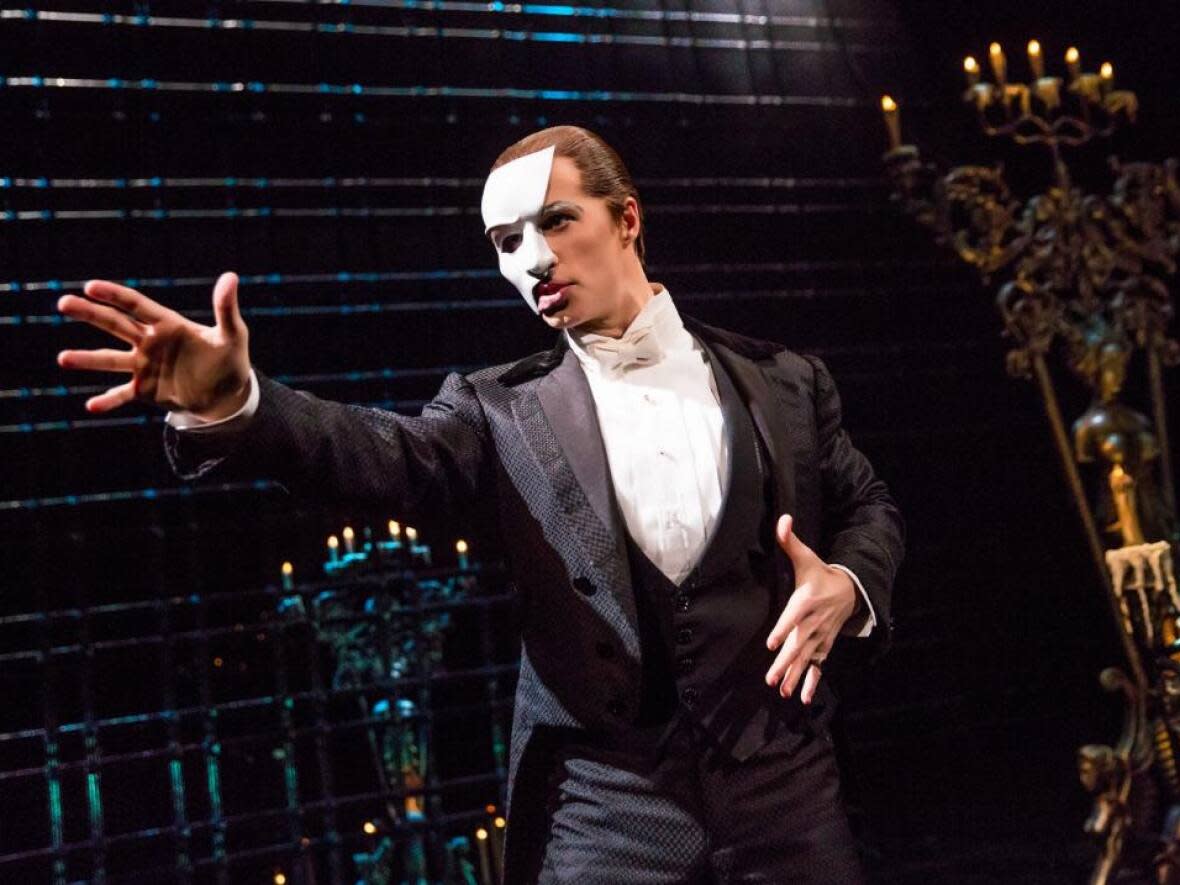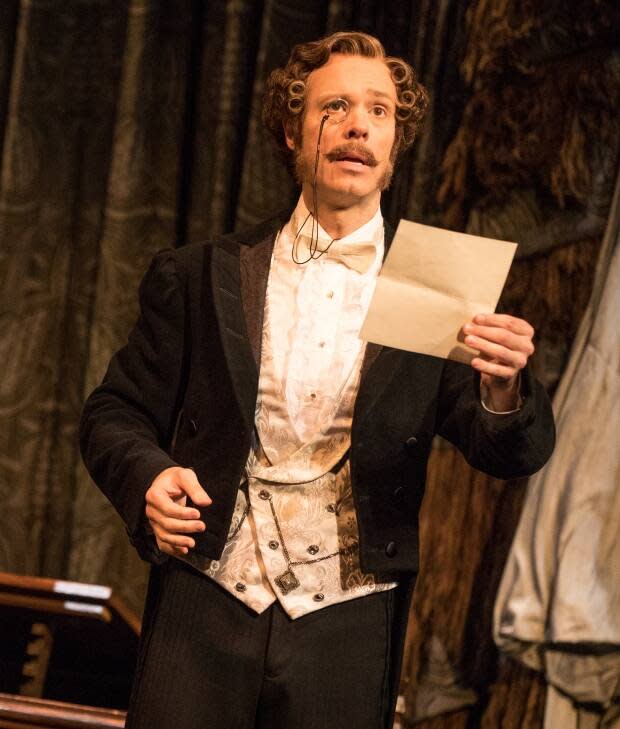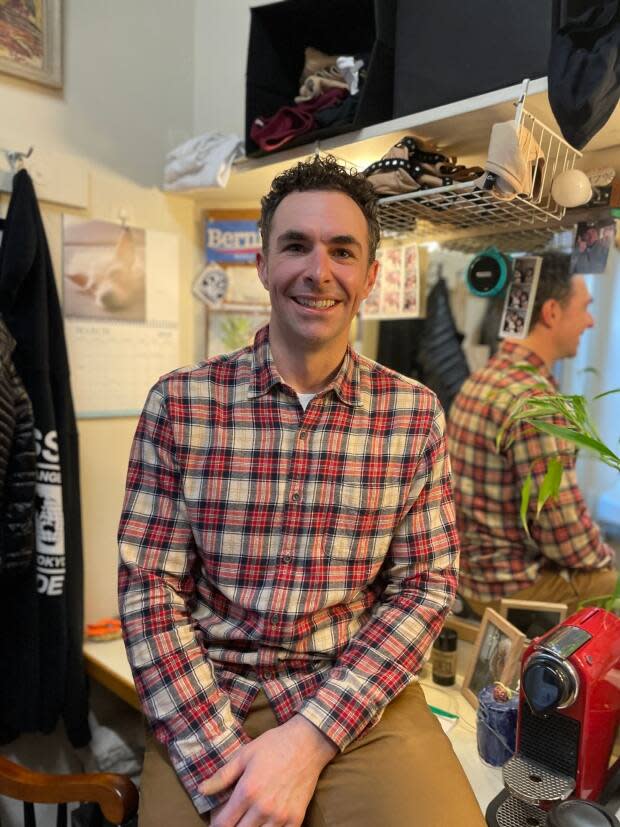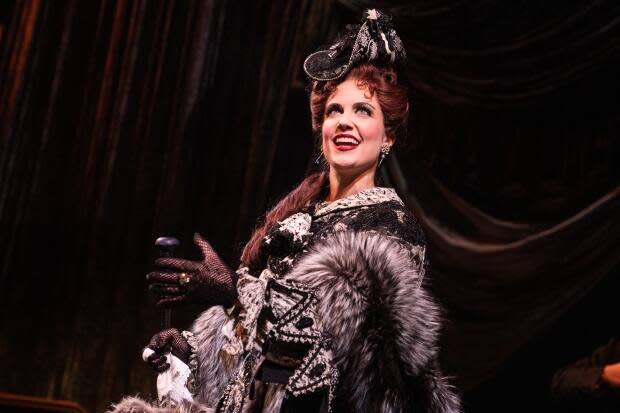As Phantom of the Opera ends its 35-year run on Broadway, a Canadian will don the mask for the last show

Standing just outside New York City's Majestic Theatre, Laird Mackintosh recalled joining the Broadway ensemble of The Phantom of the Opera 10 years ago.
"A lot of the high points in my career have been as a result of being in this show," Mackintosh said in an interview with CBC News on March 28.
The longest-running musical in Broadway history will close on Sunday after 35 years, nearly 14,000 performances, and a gross of over a billion dollars — with Mackintosh donning the iconic mask as the Phantom, Playbill reported earlier on Sunday.
Speaking to CBC News before the final performance, the show's Canadian cast members say something of the iconic musical's likeness — with its waxy candelabras, golden chandelier and hazy opulence — won't be seen again on the Great White Way.
Mackintosh, who was originally going to watch the final performance from the audience, is a Calgary performer who was a dancer in the National Ballet of Canada before he made the jump to musical theatre. He said he joined the Toronto production of Phantom in 1993, when shows in the city were "going gangbusters."
He played several roles in Toronto and in the show's U.S. tour, including the lead romantic role, Raoul, as well as the titular character. After joining the show's New York company in 2013, Mackintosh played the Phantom again — but he was cast primarily for the role of Monsieur André, the owner of the opera.

"Years later when I came to Broadway, because the show had run that long, I just aged up into another role," said Mackintosh. "That's something that doesn't usually happen in the run of a show, where actors are playing multiple roles in different ages."
It's a testament to Phantom's staying power among Broadway regulars and international audiences. With its gothic Victorian romance, lush candlelit set and iconic love songs like The Music of the Night, "the spectacle of the show is still one of the most stunning things that you would see in a production on Broadway," said Mackintosh.
But he believes the story, about a brutally disfigured man who haunts a 19th-century opera house before falling in love with a young soprano named Christine, is the draw that has sustained the show's success for more than three decades.
"At the core of this production, I think, is a central character that strikes a chord with people," said Mackintosh. "Somebody who is on the outside, ugly, deformed, but inwardly has all the richness of a very deep soul, talent — something to offer the world."
'This will never be seen again'
The Phantom of the Opera boasts a cast, crew and full orchestra of 130 people and expansive set pieces that include a one-ton replica of the Paris Opera House chandelier. Its set is manually operated by stage hands, a rarity on Broadway as newer shows rely on automation to move their sets around, according to Mackintosh.
"I think it is truly the end of an era. I mean, people who I've talked to who know, who've worked on this production from the beginning, agree that we will not see this again on Broadway," he added.

Audiences who come from around the world to see a Broadway show can expect a range of flavours: big, small, experimental, conventional, traditional Broadway shows and avant-garde shows, said Mackintosh.
"But I think Phantom does represent something that when it's gone, it will not exist anymore on Broadway."
Composer Andrew Lloyd Webber and producer Cameron Mackintosh conceived the musical after attending a production of another show called Phantom of the Opera, based on the seminal 1910 novel by Gaston Leroux. Webber decided to make his own musical adaptation of the book.
The show first opened in London's West End in 1986. When it came to Broadway in 1988, it swept the Tony Awards, taking home best musical and soon turned into a pop culture phenomenon — while also being the subject of some mockery and parody.
It later spawned a stage sequel written by Webber called Love Never Dies, and was adapted into a 2004 film starring Gerard Butler and Emmy Rossum.
LISTEN | Phantom was a Broadway fixture:
Ralph, a passionate Phantom fan who strolled by the theatre during CBC's interview with Mackintosh, stopped to tell the actor that he'd seen him perform as Phantom in May 2014.
Ralph first saw the show on Broadway in 1989 when he was seven years old. Now a father, he took his six-year-old to see the show when it reopened after COVID-19 pandemic lockdowns.
"This show is a very important part of my life," he said.
Stability, community for cast and crew
He isn't alone. For many of the performers and crew members involved, The Phantom of the Opera has been a marker of stability and consistency. Some have been with it since it originated on Broadway in the late '80s. Others — Mackintosh included — have met their partners while working on the production.
"It's a miracle in some ways," said Justin Peck, a Vancouver dancer who joined Phantom's Broadway ensemble about 11 years ago.
"It's so difficult to make a life in the arts as it is, and this has been such a blessing that something this steady and constant could be there to provide a sense of security for what is not a secure career."

Because the Broadway production has a large cast and crew that includes actors, opera singers, dancers and members of the full orchestra, a Phantom community and extended family have bloomed out of Majestic Theatre in the three decades since the show first opened. The size of the ensemble makes for a less competitive environment, said Peck.
"There's no star in this one, in a way," he said. "The star is the show.
It's also afforded its performers the time and space to improve their craft. Raquel Suarez Groen, an opera singer from Calgary, has performed in Phantom on Broadway since 2017 as Carlotta Giudicelli, a lead soprano who detests Christine.

"As a trained opera singer, I didn't know that this was a possibility — to be on Broadway. And it has taught me that you can do anything," said Groen, who used to suffer from stage fright.
Groen performs in eight shows a week on Broadway, a number "unheard of" in the opera world where the norm is two or three performances, she said.
"It has made me such a strong person to be here because doing eight shows a week requires such a different level of discipline and mental strength and physical strength," Groen said. "That's a pretty life-changing thing by itself."
LISTEN | Toronto theatre critic Glenn Sumi reflects on Phantom's legacy:


